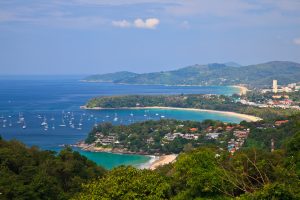On October 30, an Ikar Airlines jet landed at Phuket International Airport with 449 passengers on board. The flight’s arrival in Thailand marked the resumption of direct service from Moscow after a break of nearly three years and opened the floodgates to a surge of winter tourism from Russia. By late January, Phuket had welcomed 233,000 Russian vacationers, the single largest contingent of international arrivals to the island.
A local newspaper called the return of the Russians a “stunning comeback.” The unexpected influx helped Thailand’s tourism industry cross a coveted post-COVID-19 milestone of 10 million visitors in 2022.
The arrival of the “snowbirds” had far-reaching consequences for the local economy beyond tourism revenues. Last year, Russians became the leading purchasers of condominiums on the island, dislodging Chinese buyers from the top spot. According to Thailand’s Real Estate Information Center, 40 percent of all condos in Phuket are Russian-owned. One sales agent said that the property market was going “crazy,” fueled by war-related investor anxiety. “November, December, January was super high season, they sold more than the last 10 years,” the agent said.
Russian citizens, jittery about the long-term prospects for their economy, are stepping up their acquisitions of safe haven properties in Southeast Asia. Previously, countries like Bulgaria or Germany were top choices for real estate purchases abroad. But post-invasion, Europe is no longer the default choice. The Middle East, Turkey, and Southeast Asia were the preferred options for property purchases in 2022.
According to the Moscow-based agency Intermark Real Estate, Southeast Asia accounted for 27 percent of overseas transactions in 2022 compared to 12 percent the previous year. Unlike Istanbul or Dubai, where citizenship or relocation was part of the calculation, Russian buyers viewed Phuket or Bali real estate primarily as investments. Another factor in the region’s favor was the distance from and ambivalence towards the war in Ukraine. “Asia seems to be safe, secure, and neutral for Russian people,” noted one real estate professional specializing in the Thai property market.
In early 2022, it seemed implausible that Russian tourists would be splurging on real estate by year’s end. The February invasion of Ukraine had created a nightmare scenario for vacationers. Airlines canceled flights, and credit card companies like Visa and Mastercard suspended operations in Russia. “Cashless and flightless,” read one headline describing the plight of the 6,500 Russian tourists stranded in Thailand.
Thai travel agents shifted their focus to India and Malaysia while hoping for a rebound in the Chinese market, the mainstay of Thai tourism in the pre-COVID-19 era. “We still have China. China is out there. In the good days, you’d have nearly 40 cities in China with door-to-door travel to Phuket,” reminisced one hospitality industry consultant who predicted a “winter of discontent” for Russian vacationers. The few tourists who did show up had taken circuitous routes through third countries. The airport in Oral, a border city in Kazakhstan, became a de facto backdoor for Russians seeking flights to Phuket.
The situation changed dramatically once the Russian airlines resumed direct flights to Thailand. Aeroflot responded to the pent-up demand by adding more flights from Siberian cities like Krasnoyarsk and Novosibirsk. A Pattaya beachgoer introduced herself on a YouTube travel channel saying, “I’m from Siberia. . . It is very cold now, maybe 30 degrees below zero.” The owner of a local bar noted, “Some are tourists anxious for a two-week sunshine break . . . but others are looking to the long haul including some draft dodgers.” Pattaya locals have noticed higher-than-usual activity within the “snowbird” community for procuring driver’s licenses, bank accounts, or visa extensions this season. The superintendent of the Phuket Immigration Office said that 7,600 Russian citizens had applied to extend their stay.
The Russian market bouncing back has forced Thai officials to revise their earlier projections. The Tourism Authority of Thailand recently set an ambitious target of 1 million tourists from Russia for 2023 based on current trends. But the war continues to pose logistical challenges for travelers. Russian airspace is currently open to only a handful of international carriers. The number of flights out of Moscow and other cities remains constrained.













